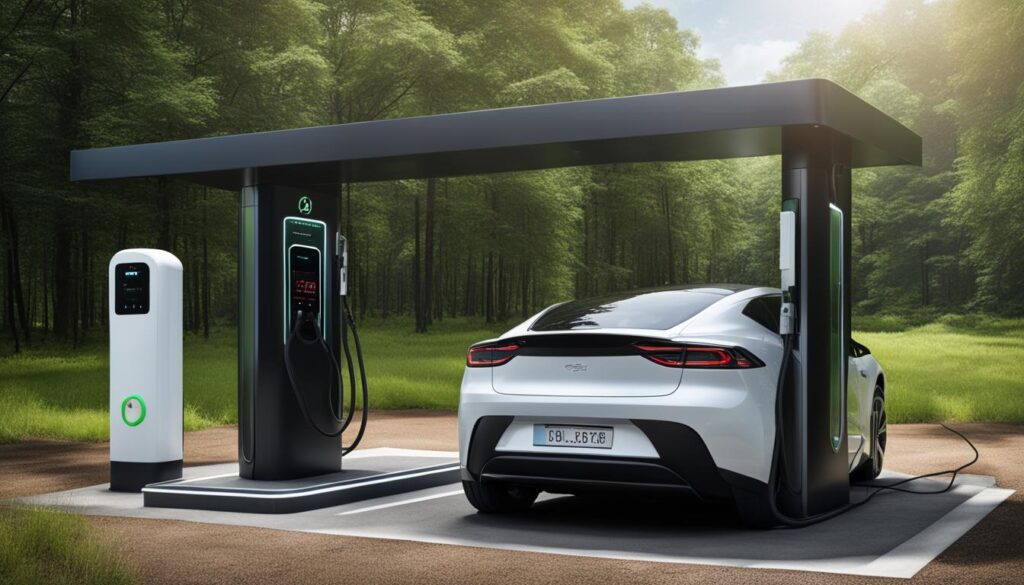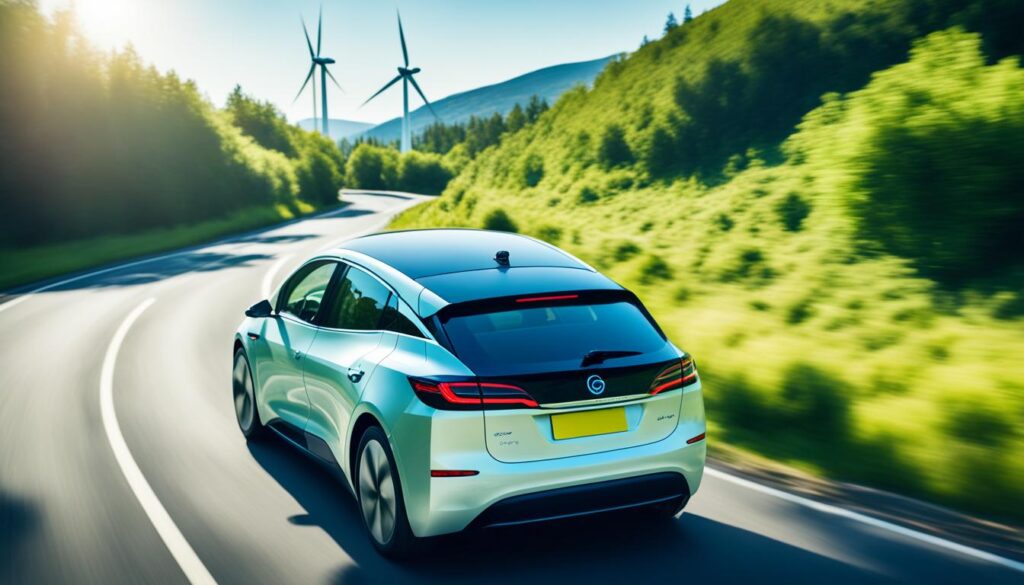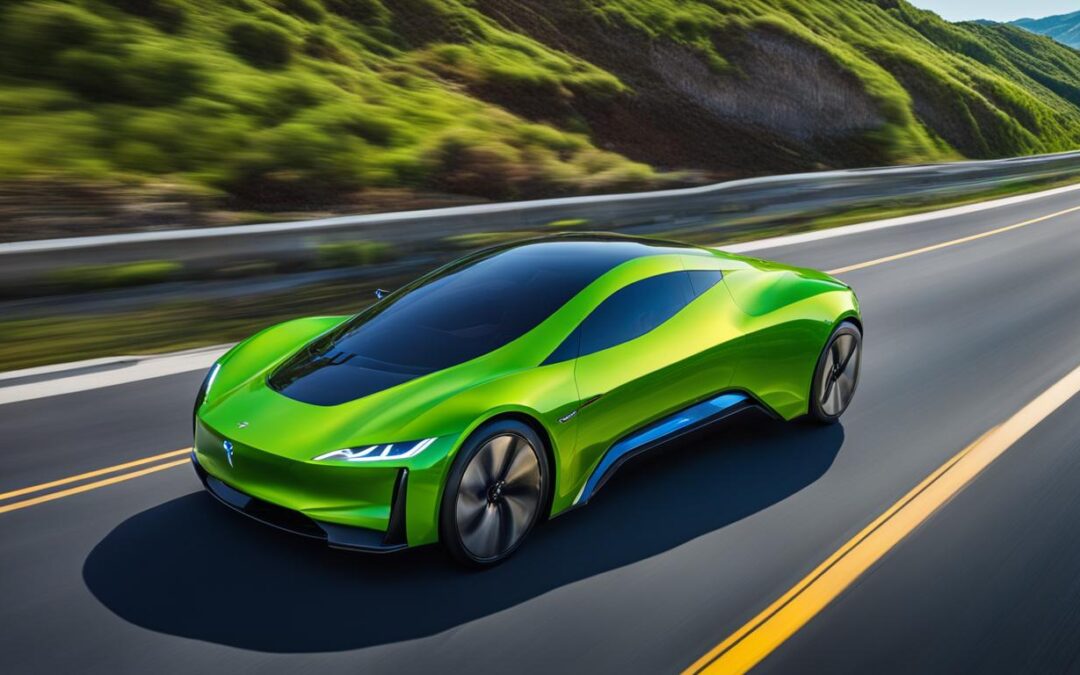Electric cars, also known as electric vehicles (EVs), are poised to revolutionize the future of transportation. With their sustainable and eco-friendly features, electric cars offer a compelling alternative to traditional gas-powered vehicles. By harnessing the power of electricity stored in rechargeable batteries, electric cars produce zero tailpipe emissions, making them better for the environment and improving air quality.
Charging an electric car can be done conveniently at home using standard 110V outlets or by installing a 240V outlet for faster charging. There is also a growing network of public charging stations available, making it easier than ever to charge your electric car on the go.
Electric cars are not only environmentally friendly but also bring significant economic benefits. Charging an electric car at home rather than filling up on gasoline can save you an average of $800 to $1,000 annually. Moreover, electric cars have fewer moving parts and fluids, which means they require less maintenance and are about 40% less costly to maintain compared to gas-powered cars.
Another advantage of electric cars is the availability of incentives. Various tax credits are available for purchasing new or used electric vehicles, as well as for home charging upgrades. These incentives can help offset the initial costs associated with electric car ownership and further promote the adoption of electric vehicles in the United States.
With advancements in electric vehicle technology and the growing commitment to sustainable transportation, it is clear that electric cars have the potential to revolutionize the future of transportation. By driving an electric car, you can be at the forefront of this positive change, contributing to a greener and more sustainable world.
So, join the movement towards sustainable transportation by embracing the benefits of electric cars. Experience the joy of driving with zero emissions and enjoy the cost-saving advantages they offer. Be a part of the electric car revolution and help shape a cleaner and more sustainable future for transportation.
What Makes Electric Cars Different from Gas-Powered Cars?
Electric cars, powered by electricity stored in rechargeable batteries, offer several significant advantages over traditional gas-powered cars. These differences arise from the unique technology that electric vehicles utilize.
Lower Maintenance Costs
One of the primary benefits of electric car technology is its simplicity. With fewer moving parts and fluids, electric cars require less maintenance compared to their gas-powered counterparts. This means fewer visits to the mechanic and potential savings on costly repairs and replacements.
Elimination of Tailpipe Emissions
Unlike gas-powered cars that emit harmful gases like carbon dioxide and nitrogen oxide, electric cars produce zero tailpipe emissions, leading to a significant reduction in air pollution. By switching to electric vehicles, you can help combat climate change and improve air quality, creating a cleaner and healthier environment for everyone.
Comparable Driving Range
One common concern about electric cars has been their driving range. However, thanks to advancements in battery technology, electric cars now offer a comparable range to conventional gas-powered cars. Modern electric vehicles can travel long distances on a single charge, making them suitable for daily commutes and even road trips.
Lower Operating Costs
Electric cars are known for their energy efficiency, which translates to lower operating costs. Electricity is generally cheaper than gasoline, allowing electric car owners to save money on fuel expenses. Additionally, electric vehicles require less maintenance, reducing the overall costs of ownership. These cost savings make electric cars a financially attractive choice for many drivers.
Government Incentives
There are also various incentives offered by the government to encourage the adoption of electric cars. Tax credits and rebates are available to reduce the upfront costs of purchasing an electric vehicle. These financial incentives further enhance the benefits and make electric cars more accessible to a wider range of consumers.
Overall, electric cars differentiate themselves from gas-powered cars through their lower maintenance costs, emissions-free operation, improved driving range, and potential cost savings. With the continuous development of electric vehicle technology and supportive government policies, electric cars are becoming increasingly attractive for individuals seeking a more sustainable and economical transportation solution.
How Can Electric Cars Benefit the Planet?
Electric cars offer significant benefits for the environment, promoting sustainability and reducing carbon emissions. Their energy efficiency is unmatched, allowing them to travel four times the distance of traditional cars using the same amount of energy. This efficiency, when combined with clean energy sources like solar or wind, results in even lower carbon emissions. In fact, electric cars emit the least amount of emissions during their entire lifecycle compared to other vehicle technologies.
By choosing electric cars, you can actively contribute to reducing your carbon footprint and minimizing pollution in your communities. These vehicles produce zero tailpipe emissions, improving air quality and creating a healthier environment for all. With a transition to electric cars, you can play a crucial role in combatting climate change and preserving the planet for future generations.
Battery electric vehicles also offer maintenance benefits, requiring less frequent and less costly tune-ups and parts replacements. This translates to long-term cost savings for you as an electric car owner. With fewer moving parts and fluids, the overall maintenance of electric cars is significantly reduced, making them more economical to maintain compared to traditional gas-powered vehicles.
To make electric car ownership even more appealing, various incentives, such as tax credits, are available. These incentives help offset the costs of owning and charging an electric car, making the switch to electric even more financially advantageous.
Benefits of Electric Cars for the Planet:
- Energy efficiency allows electric cars to travel four times as far using the same energy
- Reduced carbon emissions, especially when powered by clean energy sources
- Least emissions during the entire lifecycle compared to other vehicle technologies
- Contribution to reducing carbon footprint and minimizing pollution
Maintenance Benefits of Electric Cars:
- Less frequent and less costly tune-ups and parts replacements
- Long-term cost savings due to reduced maintenance requirements
Incentives for Electric Car Ownership:
- Tax credits available to offset the costs of owning and charging electric cars
How Do Electric Cars Save Money?
When it comes to saving money, electric cars have numerous advantages over their gasoline-powered counterparts. One of the primary ways you can save is through electric vehicle charging. By charging your electric car at home instead of filling up on gasoline, you can save anywhere from $800 to $1,000 annually. This significant cost reduction can have a positive impact on your monthly budget.
Additionally, the cost of charging away from home varies, but many charging companies offer attractive discounts or even free charging, further adding to your savings. Taking advantage of these incentives can make electric car ownership even more affordable.
But the savings don’t stop there. Electric cars also have lower operating costs compared to traditional gas-powered cars. On average, electric cars are about 40% less expensive to maintain. With fewer moving parts and fluids, there is less wear and tear, resulting in fewer repairs and maintenance expenses over the years. This not only saves you money but also saves you time spent at the mechanic’s shop.
In terms of incentives, there are several opportunities to save when purchasing an electric car. For example, drivers may be eligible for a $7,500 tax credit when buying a new clean vehicle. If you opt for a used electric car, you could still qualify for up to a $4,000 tax credit. These incentives make electric cars more affordable and encourage their adoption.
Furthermore, credits are also available for purchasing or upgrading home chargers or outlets to facilitate faster charging. This means you can receive financial assistance when investing in the infrastructure needed to support your electric vehicle charging needs.
Overall, the savings associated with electric cars can add up to thousands of dollars over the years. From reduced fuel expenses to lower maintenance costs and various incentives, electric car ownership offers significant financial benefits for drivers who choose to go electric.

How is Electric Vehicle Infrastructure Developing?
The Department of Energy and the Department of Transportation are working together to build a nationwide electric vehicle charging network across all 50 states, the District of Columbia, and Puerto Rico. This initiative aims to make electric vehicle ownership more practical and accessible, particularly in rural and underserved communities.
The expansion of charging infrastructure is vital to address the limited availability of charging stations and alleviate “range anxiety” among potential electric car owners. Governments and private companies are investing in the installation of charging stations in urban areas, along highways, and in commercial spaces to meet the growing demand for electric car charging.
One key component of this development is the establishment of a nationwide EV charging network, which will provide a widespread and convenient charging infrastructure for electric vehicle owners. This network will allow EV drivers to travel confidently across the country, knowing that charging stations are readily available.
- By building a nationwide EV charging network, the government is addressing the need for more accessible and reliable charging infrastructure.
- The network will enable electric vehicle owners to charge their vehicles conveniently, both at home and on the go.
- Installation of charging stations in various locations will provide peace of mind to electric car owners, eliminating concerns about finding a charging point.
- Investments from both the public and private sectors are crucial to expanding the EV charging network and meeting the growing demand for electric vehicle charging.
As electric vehicle adoption continues to increase, the development of a nationwide charging network is a significant step toward a more sustainable and efficient transportation system. With improved infrastructure, electric cars will become a more practical and viable option for a wider range of individuals and communities.
Why Are Electric Cars the Future of Transportation?
Electric cars are paving the way for the future of transportation, offering a host of benefits that make them an attractive and sustainable alternative to traditional gas-powered vehicles. With lower operating costs, reduced emissions, and improved energy efficiency, electric cars are driving a positive change in the automotive industry.
As governments worldwide commit to ambitious targets for reducing greenhouse gas emissions, electric cars play a crucial role in achieving these goals. By relying on electric power rather than fossil fuels, these vehicles significantly contribute to the reduction of emissions that harm our planet. This shift towards cleaner transportation is essential for mitigating climate change and improving air quality for future generations.
The advantages of electric cars go beyond environmental considerations. Drivers can enjoy lower operating costs due to the affordability of electricity compared to gasoline. Charging an electric car at home is not only convenient but can also lead to substantial savings. In fact, on average, electric car owners can save $800 to $1,000 annually by choosing to charge at home instead of filling up at a gas station.
Furthermore, electric cars have fewer moving parts and fluids compared to conventional vehicles, resulting in lower maintenance costs and fewer visits to the auto shop. This translates to significant long-term savings, as electric cars are approximately 40% less costly to maintain than their gasoline counterparts.
One of the key advantages of electric cars is their versatility. Electric vehicle technology is not limited to passenger cars but also extends to buses, trucks, and utility vehicles. This adaptability makes electric vehicles suitable for various sectors, facilitating a transition towards cleaner and more sustainable transportation across industries.

The future of transportation lies in electric cars, with their myriad benefits and significant potential to transform the way we travel. With ongoing advancements in technology, the driving range of electric cars continues to improve, alleviating concerns about limited distances that were prevalent in the earlier stages of electric vehicle adoption.
In conclusion, electric cars are at the forefront of the automotive industry’s evolution towards sustainability. Their ability to reduce emissions, lower operating costs, and offer versatile solutions for transportation needs positions them as the ideal choice for a greener and more efficient future.
What Are the Challenges in Electric Vehicle Adoption?
Despite the many benefits of electric vehicles, their adoption still faces significant challenges that need to be addressed. Two of the main obstacles are limited infrastructure and range anxiety.
1. Limited Infrastructure
One of the primary concerns for potential electric car owners is the availability of charging infrastructure. Unlike traditional gas stations, charging stations for electric vehicles are not as widespread, making it harder to find a convenient charging point. This limited infrastructure poses a barrier to wider adoption of electric cars, as consumers fear being unable to charge their vehicles when needed.
2. Range Anxiety
Another challenge is range anxiety, which refers to the fear of running out of battery power before reaching a charging station. The limited driving range of some electric vehicles can cause apprehension among drivers, especially on longer journeys. This anxiety can discourage potential buyers who rely on their vehicles for daily commuting or travel.
Fortunately, steps are being taken to overcome these challenges. Governments and private companies are investing in expanding the charging infrastructure to make electric vehicle ownership more practical and accessible. The aim is to create a reliable and widespread charging network that can alleviate concerns about finding charging points.
Another significant development is the improvement in battery technology. The latest advancements allow for longer driving ranges and faster-charging capabilities, gradually alleviating range anxiety. As battery technology continues to evolve, consumers can have increased confidence in the reliability and practicality of electric vehicles.
By addressing the challenges of limited infrastructure and range anxiety, the adoption of electric vehicles can continue to grow. A more robust charging network and improved battery technology will pave the way for a future where electric cars are a viable and convenient mode of transportation for everyone.
How Can Havis Help Overcome Electric Vehicle Challenges?
Havis specializes in providing innovative solutions to help energy and utility companies overcome the challenges of electric vehicle adoption. Their comprehensive vehicle upfitting services customize electric vehicles to meet the specific needs of these industries.
With Havis, you can take advantage of cutting-edge consoles, docking stations, and storage solutions that enhance functionality, performance, and safety in electric vehicles. These solutions not only improve your driving experience but also address limitations such as limited charging infrastructure and range anxiety.
By partnering with companies like Havis, energy and utility companies can seamlessly integrate electric vehicles into their fleets and embrace the future of transportation. Havis offers top-of-the-line electric vehicle integration solutions that enable you to optimize your operations, reduce costs, and stay ahead of the curve in the rapidly evolving electric vehicle market.
How Does Electric Vehicle Adoption Benefit the Energy and Utility Industry?
Adopting electric vehicles offers a myriad of benefits for the energy and utility industry. By embracing electric vehicle technology, companies can effectively reduce their carbon footprints and showcase their commitment to environmental sustainability, aligning with global initiatives to combat climate change. Electric vehicles produce zero tailpipe emissions, which significantly contributes to the reduction of greenhouse gases and pollutants in the air.
In addition to the environmental advantages, electric vehicles also bring about substantial cost savings for energy and utility companies. Compared to traditional gasoline-powered vehicles, electric cars have lower maintenance costs due to their fewer moving parts and simplified drivetrain. Maintenance tasks such as oil changes, transmission repairs, and exhaust system maintenance are no longer required, resulting in significant financial savings.
Moreover, adopting electric vehicles helps to reduce fuel expenses. Electric cars operate on electricity, which is cheaper than traditional gasoline. This cost differential becomes more pronounced as electricity prices remain stable while fuel prices fluctuate. By introducing electric vehicles into their fleets, energy and utility companies can optimize their fuel budget and allocate resources more efficiently.
Furthermore, electric vehicle adoption allows for optimized fleet management. Companies can leverage advanced telematics and tracking systems installed in electric vehicles to monitor their performance, usage patterns, and charging needs. This data-driven approach enhances fleet management practices, leading to improved operational efficiency and reduced downtime.
These environmental and financial benefits directly contribute to the improved profitability of energy and utility companies. By embracing electric vehicle adoption, companies become more competitive in the industry, meet evolving environmental regulations, and positively impact their bottom line. Additionally, the transition to electric vehicles enhances the reputation of energy and utility companies as responsible corporate citizens and leaders in sustainability.
Conclusion
The widespread adoption of electric cars represents a revolution in transportation, offering sustainable and eco-friendly alternatives to traditional gas-powered vehicles. Electric vehicles are powered by electricity stored in rechargeable batteries, reducing emissions and improving air quality. They offer lower operating costs, decreased maintenance expenses, and financial incentives for owners.
Despite challenges such as limited charging infrastructure and range anxiety, governments and companies are investing in developing a nationwide electric vehicle charging network. Companies like Havis play a crucial role in overcoming these challenges by providing innovative solutions for electric vehicle integration.
The adoption of electric cars benefits not only individuals but also the energy and utility industry, contributing to reduced carbon footprints and cost savings. With the continuous advancements in electric vehicle technology and infrastructure, electric cars are poised to revolutionize the future of transportation, creating a more sustainable and efficient world.

